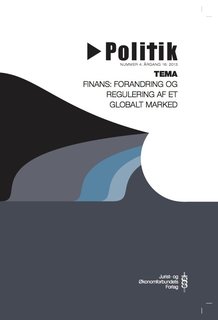Financial Derivatives: Fiscal Weapons of Mass Destruction
DOI:
https://doi.org/10.7146/politik.v16i4.27558Abstract
Contemporary derivatives mark the development of capital and constitute a novel form of ownership. In abstracting from the object of ownership, the underlying asset, derivatives sever direct material ties be- tween the owner and property and, in doing, transform the capacities of ownership. is transformation is spatial, temporal and legal. is is signi cant for relations between borrowers and lenders, between the various participants in nancial markets, and, indeed, for the overarching institutional fabric of the politi- cal economy. However, one relatively neglected aspect of the transformations manifest through derivatives is the relationship between the scal state and nancial innovation. By recon guring the temporal, spatial and legal character of ownership derivatives present a substantive challenge to the tax collecting state. While scal systems are nationally bounded and inherently static, capital itself is unprecedentedly mobile, uid and fungible. In these terms, nancial derivatives not only challenge default conceptions of the o shore world in International Political Economy, which have predominantly focused on nationally variegated tax systems, but via abstraction recon gure the materiality of contemporary capitalism.
Downloads
Published
How to Cite
Issue
Section
License
Forfattere, der publicerer deres værker via dette tidsskrift, accepterer følgende vilkår:
- Forfattere bevarer deres ophavsret og giver tidsskriftet ret til første publicering, samtidigt med at værket er omfattet af en Creative Commons Attribution-licens, der giver andre ret til at dele værket med en anerkendelse af værkets forfatter og første publicering i nærværende tidsskrift.
- Forfattere kan indgå flere separate kontraktlige aftaler om ikke-eksklusiv distribution af tidsskriftets publicerede version af værket (f.eks. sende det til et institutionslager eller udgive det i en bog), med en anerkendelse af værkets første publicering i nærværende tidsskrift.
- Forfattere har ret til og opfordres til at publicere deres værker online (f.eks. i institutionslagre eller på deres websted) forud for og under manuskriptprocessen, da dette kan føre til produktive udvekslinger, samt tidligere og større citater fra publicerede værker (se The Effect of Open Access).

